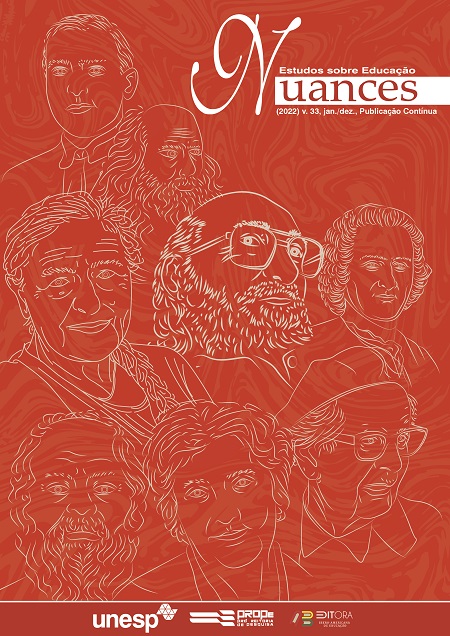Elementos estruturais de um sistema social
Instituições políticas e educacionais
DOI:
https://doi.org/10.32930/nuances.v33i00.9487Palavras-chave:
Mundo não linear, Transformações institucionais, Sociedade, FlutuaçãoResumo
Este artigo discute as questões relacionadas à transformação de elementos estruturais em um sistema social. Demonstra que qualquer transformação é sistêmica. O estudo comprova que as transformações acima mencionadas são causadas por mudanças nos princípios básicos das instituições sociais. Os sistemas sociais são caracterizados pela auto-organização e muitas vezes complementados pela gestão externa. A ideia de transformações permanentes em várias instituições no mundo não linear se concretiza no fato de que instituições específicas devem corresponder às necessidades reais da sociedade e de seus membros. Ao mesmo tempo, a prioridade é conseguir um efeito cumulativo usando os recursos sociais de tal forma que o potencial intelectual de todo o grupo e de cada indivíduo se manifeste plenamente.
Downloads
Referências
BELUKHINA, N. N. Sistema distantsionnogo obrazovaniya s tochki zreniya sinergeticheskoi paradigmy [The system of distance education from the standpoint of the synergetic paradigm]. Izvestiya VGPU, v. 4, n. 22, p. 50-53, 2007. Disponível em: https://cyberleninka.ru/article/n/sistema-distantsionnogo-obrazovaniya-s-tochki-zreniya-sinergeticheskoy-paradigmy. Acesso em: 16 fev. 2021.
GAISINA, L. M. Sinergeticheskii podkhod i ego primenenie v issledovanii organizatsionnykh struktur i sistem upravleniya: Vozmozhnosti i ogranicheniya [The synergetic approach and its use in studying organizational patterns and management systems: Possibilities and limitations]. Vestnik UGNTU. Nauka, obrazovanie, ekonomika. Seriya ekonomika, v. 3, n. 17, p. 155-162, 2016. Disponível em: https://cyberleninka.ru/article/n/sinergeticheskiy-podhod-i-ego-primenenie-v-issledovanii-organizatsionnyh-struktur-i-sistem-upravleniya-vozmozhnosti-i-ogranicheniya. Acesso em: 14 abr. 2021.
GOLOVASHINA, O. V.; ZHUKOV, D. S. Nelineinye effekty dinamiki sotsialno-politicheskikh institutov [Nonlinear effects of the dynamics of social and political institutions]. Ineternum, n. 2, p. 49-59, 2012. Disponível em: https://cyberleninka.ru/article/n/nelineynye-effekty-dinamiki-sotsialno-politicheskih-institutov. Acesso em: 16 abr. 2021.
GOTNOGA, A. V. Sinergetika i nelineinye teorii sotsialnykh izmenenii [Synergetics and nonlinear theories of social changes]. Filosofiya i obshchestvo, n. 2, p. 105-115, 2010. Disponível em: https://www.socionauki.ru/journal/articles/126690/. Acesso em: 18 ago. 2021.
KUDASHOV, V. I. et al. Historical reflection in the educational process: an axiological approach. Analele Universitatii din Craiova – Seria Istorie, v. 22, n. 1, p. 139-147, 2017. Disponível em: https://elib.sfu-kras.ru/bitstream/handle/2311/69566/statya-skopus_1_1.pdf?sequence=1. Acesso em: 11 set. 2021.
KULPIN, E. S. VOSTOK (Chelovek i priroda na Dalnem Vostoke) [East (Human and nature in the Far East)]. Moscow: Moskovskii litsei, 1999.
MIROSHNICHENKO, I. V., MOROZOVA, E. V. Transformatsiya politicheskikh institutov v prostranstve setevogo frontira [The transformation of political institutions in the web frontier]. PolitBook, n. 3, p. 36-49, 2016.
MUSAT, R. P. et al. The artistic worldview in the context of sociocultural realia. Amazonia Investiga, v. 8, n. 23, p. 350–357, 2019. Disponível em: https://amazoniainvestiga.info/index.php/amazonia/article/view/878. Acesso em: 11 mar. 2021.
NIKOLAEVA, E. M. Sotsialnaya filosofiya i sinergetika [Social philosophy and synergetics]. Naberezhnye chelny: Izd-vo Kamskogo politekhn. un-ta, 2001.
PAVLOV, A.P. et al. Existential and archetypal architectonics of social (societal) order. International Journal of Recent Technology and Engineering, v. 8, n. 2, p. 4148-4153, 2019. Disponível em: https://www.elibrary.ru/item.asp?id=41792545. Acesso em: 10 maio. 2021.
PAVLOV, A. P. et al. The dialectics of rational and existential analysis of social autopoiesis. Revista Inclusiones, v. 7, n. S3-5, p. 431-446, 2020. Disponível em: https://www.revistainclusiones.org/index.php/inclu/article/view/1175, Acesso em: 20 abr. 2021.
PETROVA, L. R. Anatomiya sotsialnykh izmenenii cherez prizmu sinergeticheskogo podkhoda [The anatomy of social changes within the framework of the synergetic approach]. Vestnik Bashkirskogo universiteta, v. 16, n. 3, p. 814-818, 2011.
RAVOCHKIN, N. N. et al. Genesis of ideas in the course of intersubjective interactions between intellectuals. Laplage em Revista, v. 7, p. 397-404, 2021. Disponível em: https://laplageemrevista.editorialaar.com/index.php/lpg1/article/view/1207. Acesso em: 03 out. 2021.
RAVOCHKIN, N. N. et al. Ideological determination of social transformations in modern society. Revista Inclusiones, v. 7, n. esp., p. 11-20, 2020a. Disponível em: https://www.revistainclusiones.org/index.php/inclu/article/view/1140. Acesso em: 10 fev. 2021.
RAVOCHKIN, N. N. et al. Intellectual diversity in postmodern reality. Revista Inclusiones, v. 7, n. esp., p. 338-348, 2020b. Disponível em: https://www.revistainclusiones.org/index.php/inclu/article/view/1375. Acesso em: 9 jun. 2021.
SHTYRBUL, A. A. K. Probleme nelineinosti v mirovom istoricheskom protsesse [The nonlinear nature of global historical processes]. Gumanitarnye issledovaniya, v. 3, n. 20, p. 56-61, 2018.
TSYRENDORZHIEVA, D. Sh. Dinamika obshchestva: sinergeticheskii analiz [The dynamics of society: synergetic analysis]. Izvestiya Tomskogo politekhnicheskogo universiteta, v. 316, n. 6, p. 79-82, 2010.
ZBOROVSKII, G. E.; SHUKLINA, E. A. O kontseptsii nelineinogo razvitiya vysshego obrazovaniya v Rossii [On the concept of the nonlinear development of higher education in Russia]. Vestnik Surgutskogo gosudarstvennogo pedagogicheskogo universiteta, v. 2, n. 41, p. 52-62, 2016. Disponível em: https://cyberleninka.ru/article/n/o-kontseptsii-nelineynogo-razvitiya-vysshego-obrazovaniya-v-rossii. Acesso em: 14 jul. 2021.
ZHUKOV, D. S. Kompyuternoe modelirovanie «turbulentnoi» modernizatsii sotsialno-politicheskikh institutov [The computer modelling of the "turbulent" modernization of social and political institutions]. Sotsialno-ekonomicheskie yavleniya i protsessy, v. 11, n. 45, p. 278-284, 2012. Disponível em: https://cyberleninka.ru/article/n/kompyuternoe-modelirovanie-turbulentnoy-modernizatsii-sotsialno-politicheskih-institutov. Acesso em: 15 set. 2021.
ZHUKOV, D. S.; LYAMIN, S. K. Podkhody k postroeniyu fraktalnoi modeli transformatsii administrativno-politicheskikh institutov [Approaches to forming the fractal model of transforming administrative and political institutions]. Fractalsimulation, n. 1, p. 21-25, 2011. Disponível em: https://cyberleninka.ru/article/n/podhody-k-postroeniyu-fraktalnoy-modeli-transformatsii-administrativno-politicheskih-institutov. Acesso em: 12 abr. 2021.
Downloads
Publicado
Como Citar
Edição
Seção
Licença
Copyright (c) 2022 Nuances: Estudos sobre Educação

Este trabalho está licenciado sob uma licença Creative Commons Attribution-NonCommercial 4.0 International License.
Atribuição-NãoComercial
CC BY-NC
Esta licença permite que outros remixem, adaptem e criem a partir do seu trabalho para fins não comerciais, e embora os novos trabalhos tenham de lhe atribuir o devido crédito e não possam ser usados para fins comerciais, os usuários não têm de licenciar esses trabalhos derivados sob os mesmos termos.





